Miss Piggy's 'a mess inside': Frank Oz and puppeteer pals reveal Muppet secrets
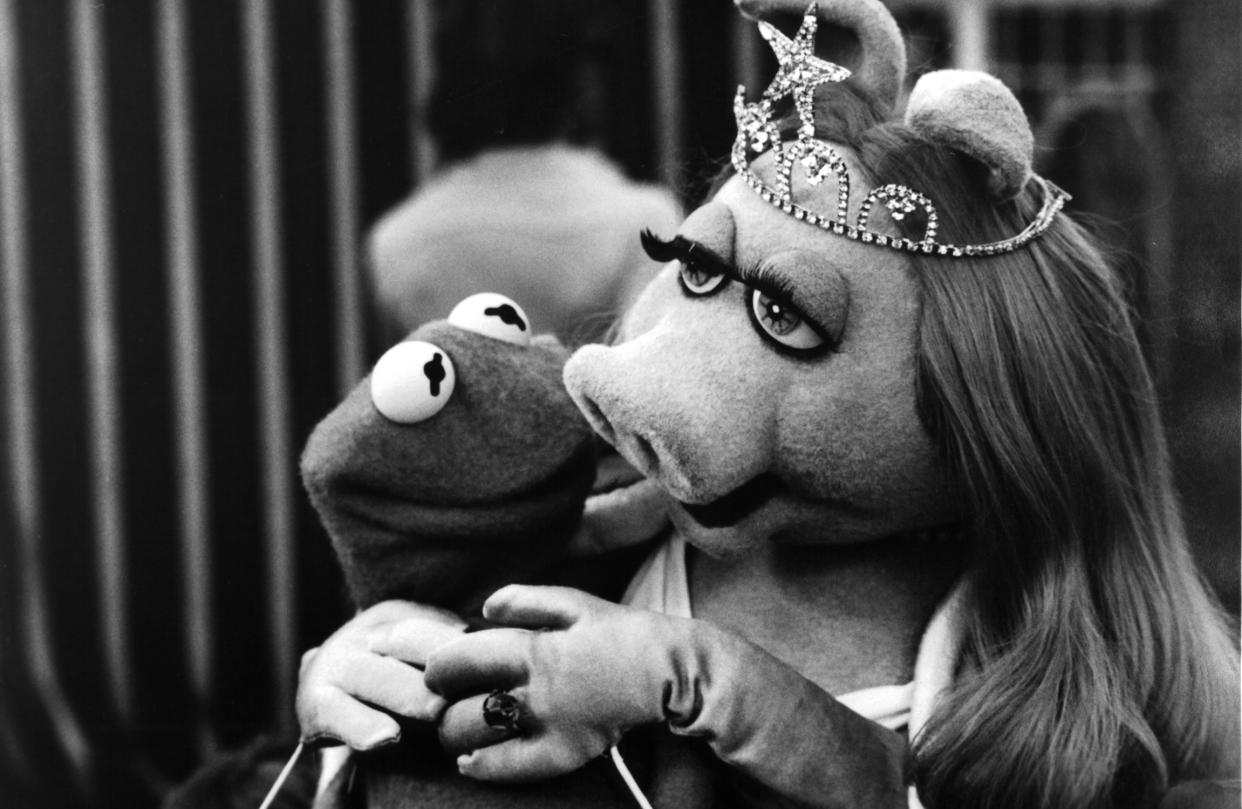
A conversation with the “Muppet guys” is not like a conversation with other people. During a roundtable interview with Yahoo Entertainment, Frank Oz, Dave Goelz, Fran Brill, and Bill Barretta spoke thoughtfully and fondly about their experiences creating and performing Jim Henson’s Muppets. At the same time, these friends speak a language all their own, a playful cacophony of gestures, jokes, character voices, one-upmanship, and riffs on their shared memories. It’s something that really needs to be experienced to be understood — but you don’t have to take my word for it.
Oz’s documentary Muppet Guys Talking (available March 16 exclusively at MuppetGuysTalking.com) gives Muppet fans the chance to pull up a chair and enjoy a casual, intimate conversation between the longtime colleagues. The film’s participants include director Oz (performer of Fozzie Bear, Bert, Cookie Monster, Missy Piggy, Animal, Grover), who was Henson’s closest collaborator during his lifetime; Goelz (the Great Gonzo, Bunsen Honeydew, Traveling Matt, Boober Fraggle, Beauregard), who started out as a puppet maker and became a principal performer; Brill (Prairie Dawn, Zoe, Little Bird), one of the few original female performers on Sesame Street and The Muppet Show; Barretta (Pepe the King Prawn, Bobo the Bear, Big Mean Carl), who began performing with the Muppets in the ’90s and now plays several of Henson’s characters, including Rowlf and Dr. Teeth; and Jerry Nelson (Count von Count, Snuffleupagus, Emmett Otter, Robin), a longtime Muppeteer who died in 2012 after a long illness. Muppet Guys Talking was produced and conceived by Oz’s wife, Victoria Labalme, who saw in the Muppet performers’ relationship something that deserved to be captured on film.
Watch a trailer for Muppet Guys Talking.
In the first part of our interview with the Muppet guys, the four performers reveal their secrets for getting into character, including what they’re doing underneath the floorboards while the Muppets are above their heads. Oz tells us the one word he needs to say to become Bert, and Baretta explains the facial expression that makes the difference between Dr. Teeth and Rowlf.
The performers also talk about how their characters have changed over time, particularly Miss Piggy, whom Oz describes as “such a mess inside.” Brill speaks about her experience being the only woman working on the Muppets, occasionally taking on characters who were “kind of chauvinistic … but funny.” The friends discuss the hazardous situations they sometimes put themselves in for the sake of the Muppets, whether it was Oz lighting his arm on fire for a commercial or Goelz working his Fraggle Rock character from inside a landfill. Finally, Oz details the perfectionism that made him put his friends “through hell” on The Muppets Take Manhattan — and opens up about how he used to sabotage Sesame Street takes.
Read on for the full conversation and stay tuned for Part 2, in which the Muppet guys share their memories of Jim Henson.
Yahoo Entertainment: Tell me, Frank and Victoria, what made you want to make this particular film with these particular people.
Frank Oz: I don’t know anybody else!
Dave Goelz: He has no other friends.
Fran Brill: Certainly no one who would agree to do it.
Oz: It was all because of Victoria. I wanted to do it in the beginning because I wanted to give these guys their due — people don’t know these guys. But then Victoria made me realize there was a larger reason.
Victoria Labalme: I think it’s very rare in today’s society to see this kind of spirit of collaboration, of playfulness, of professionalism mixed with fun, of a sense of real respect and listening to each other and bringing the best out in each other. And I thought that should be shared with the world.
Goelz: Well, yeah, we’re living in a cynical time here. The whole culture is more cynical than it was then. And I think part of wanting to do this is to talk about that innocence and the way it brings out more in people, creates a safe environment, and spurs creativity. And life is better.
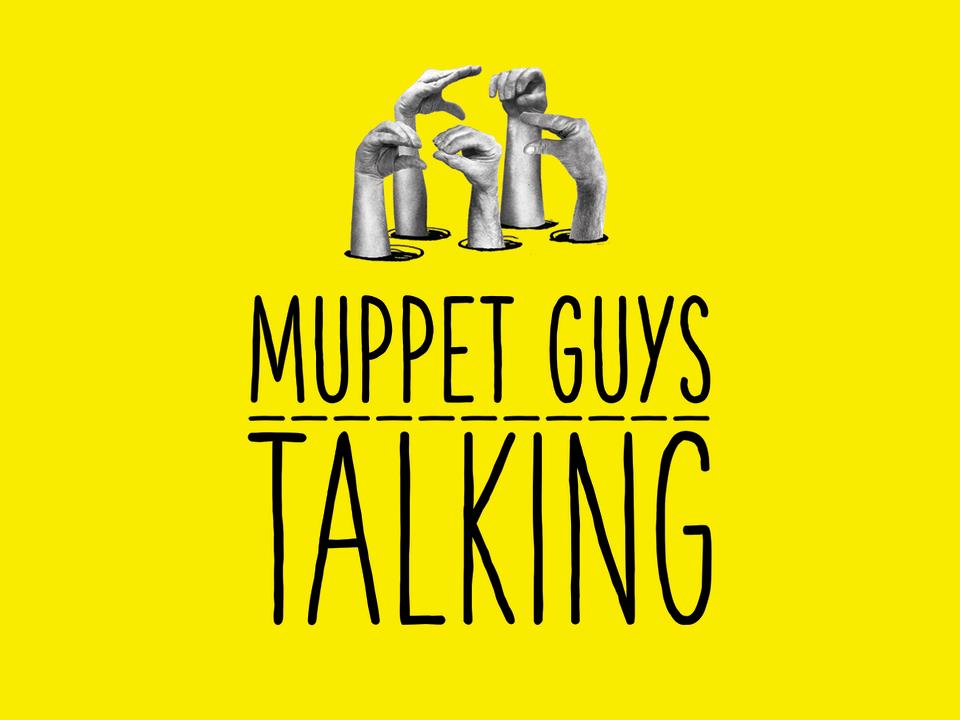
The Muppet Guys Talking poster is just your hands, in position as if you’re working puppets. When I hold up my hand, it’s just a hand. But when you do it, the hand is alive. What are you thinking when you hold up that hand?
Oz: As soon as I put my hand up, I’m observing.
Brill: Waiting.
Barretta: Listening.
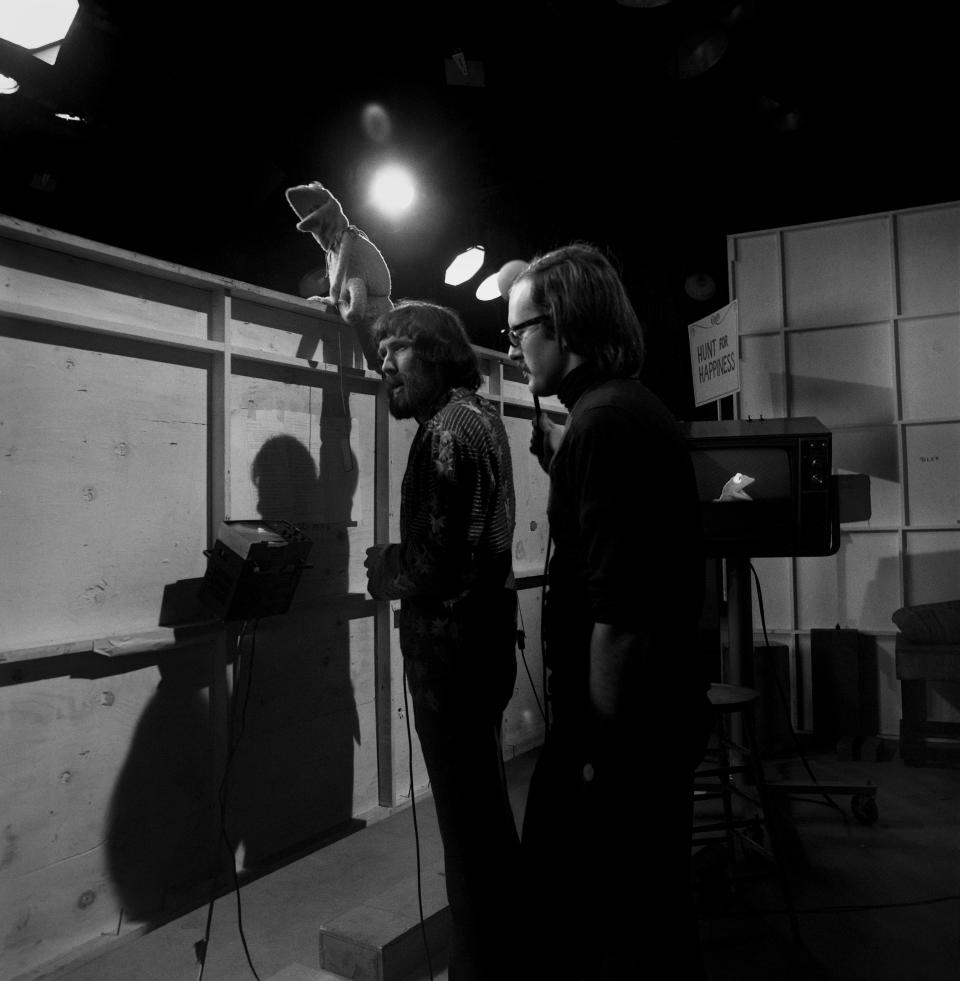
You also talked a little in the movie about how when you have the puppet up top and you’re beneath the floorboards, you do a lot of overacting to create small reactions in the puppet. Are there habits you have with the characters that nobody sees, movements with your face or body while you’re under the shot?
Goelz: Sure, we make these ridiculous expressions. One of my favorite things to do is always to stand in front of Frank’s monitor and mirror his face.
Oz: I wouldn’t want people watching me, because then I’m self-conscious and I can’t perform.
Goelz: That’s exactly what used to happen. I would mirror your expression, and you would lose it, and we’d have to do another take.
Dr. Teeth, performed by Jim Henson, sings “Can You Picture That?” with the Electric Mayhem in The Muppet Movie (1979). Drummer Animal was performed by Frank Oz, bassist Floyd by Jerry Nelson, and saxophonist Zoot by Dave Goelz.
Barretta: One thing I learned, actually — when I first started doing Dr. Teeth, Dave brought up that when he would watch Jim perform Dr. Teeth, he would do this [grimace smiles] kind of through his teeth.
Goelz: As much of a smile as he could get. He would just strain at it.
Barretta: And it also creates a sound quality that’s different from a character with a similar voice, like Rowlf.
Oz: Also it’s important physically. Animal is always [grinning and doing Animal] “wiiiide,” so I gotta be always wide. It depends on the size of the mouth.
Goelz: And that comes from the puppet.
Zoe, performed by Fran Brill, was introduced to Sesame Street in 1993.
Brill: With Zoe, she was designed like a football, with a very wide mouth, so I tried to do a Carol Channing thing — [Carol Channing voice] “because Carol Channing talks like that” — and I tried, and I tried, and it just was very forced and didn’t feel like it was coming from me. But I think I usually take my cue from, what does that puppet look like and what is the mouth doing?
Barretta: Also, I think a lot of times we’re using our arms to make them walk and move in a certain way. I walk a lot in place. Like if I’m doing Bobo, you know [does Bobo, walking in place], when I’m walking I kind of do this thing under there, because he’s very stiff in his neck, and then I turn this way a little bit — but my whole body is doing it down there, hoping it translates.
Goelz: Yeah, Bobo can’t turn his head.
Barretta: [Doing Bobo] “What’s goin’ on back there?”
Goelz: It’s a weakness in the puppet that becomes a strength in the character. That limitation is fun.
Brill: Well said.
Bobo the Bear, performed by Bill Barretta, and Beauregard, performed by Goelz, in a Muppet Musings sketch from 2011.
Frank, you talk in the film about having a “lock” for the character, a certain sound that you make to get into Grover. Is that something that you have for all your characters?
Oz: I haven’t worked with them for so many years, but I did with Grover, I did with Bert —
Goelz: What was Bert’s?
Brill: I was just going to ask.
Oz: Yelling, “Ernie!” like Costello would be yelling for Abbott. “Ernieeee!”
Bert, originally performed by Oz, and Ernie, originally performed by Jim Henson, on Sesame Street.
Is that something the rest of you do or did?
Barretta: I growl for Dr. Teeth a little bit.
Oz: You do that normally anyway.
Goelz: I think it happens in the early stages of a character more than later, because later it’s reflexive. A couple years ago I did a character, a new one called Chip the IT Guy, and I had a little key phrase for him. It was [as Chip] “I’ll figure it out.” And I always went back to that when I was trying to figure out who the heck he was; for the whole season I was trying to develop the character. And I was also trying to surprise myself all the time. There were a lot of times when he was startled by somebody and he had to react, and I made a point of not planning it and just doing something on the spur of the moment. As opposed to creating the character in my head, I just thought, what would happen if I just try to live it? And make a stupid reaction, a ridiculous reaction, and not know what it’s going to be? I had a lot of fun doing that.
Chip the IT Guy, performed by Goelz, introduces himself on the half-hour ABC comedy The Muppets (2015-2016).
Brill: I think as soon as I get my hand in a puppet that I do all the time, and I see her on camera, everything is right there immediately: the voice, who she is, how she stands, everything. With a new character, I’m sort of learning as I do it. Like waiting for the puppet to tell me, OK, she stands like this. It’s sort of discovering who she is at that moment. I think it just becomes instinct, like most jobs, after a while.
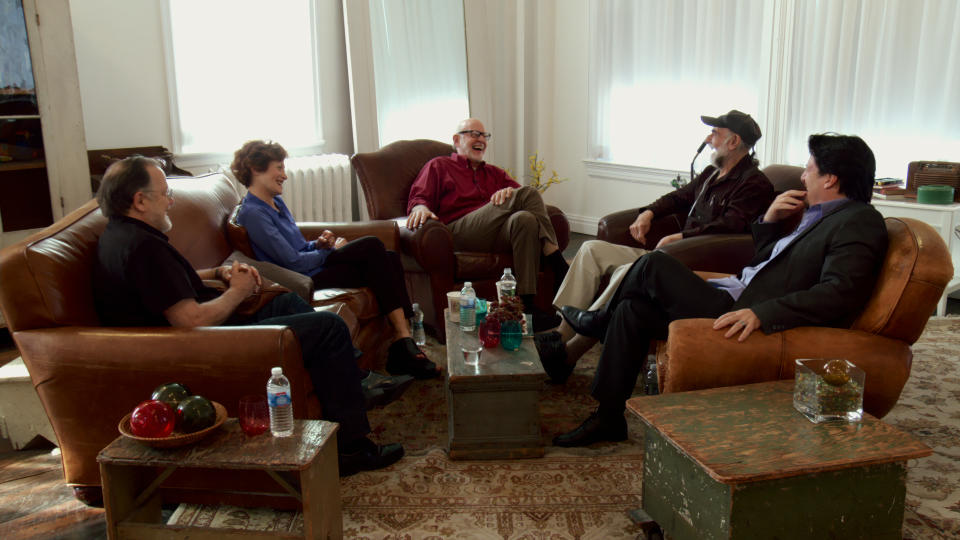
The characters that all of you have played for a long time — do you find that those characters have changed with you?
Brill: Prairie Dawn was my first real principal character. I was handed this little puppet, and she was supposed to be very, very sweet. But that was very boring to me, to just be very passive and sweet all the time. So she got a little stronger over the years. But with Zoe, there was nothing. No drawing. They just wanted somebody who would be a buddy of Elmo. And that was much more difficult, because there was nothing to look at visually for me where I would come up with a character. But I went around and I watched other 3-year-olds — because they wanted her to be 3, and seeing how they acted, how they moved, how they talked — and came up with some catchphrases that at least gave me some basis, like [as Zoe] “Don’t joke me!” But they both changed, of course. The more I got to know who they were, the more they changed, if that makes any sense.
Prairie Dawn, performed by Brill, on Sesame Street.
Barretta: Pepe was written at first — he was supposed to be this guy who just wanted to be in show business but had a language barrier. But then over time, I don’t know how it happened, he just became this kind of ladies’ prawn, you know? He was very much into the women. And then women seemed to respond to him for whatever reason.
Brill: The accent. Has to be the Latin accent.
Pepe the King Prawn, performed by Barretta, in scenes from Muppets in Space. (1999)
Barretta: And I think he’s blunt, and he cuts through a lot of the crap. Now he’s much more confident and just loves his life, because he’s got women all over the world. He can go to any city, and he has a place to stay. So, yeah, he changed over time.
Goelz: We’ve done some of these characters for a long time, it’s like 40 years, so there’s also the element of trying to keep them interesting. And keeping them interesting to us means finding new wrinkles, new nuances to their character. With Bunsen Honeydew, he started out to be kind of a guy who misses the big picture because he’s so specific, and over the years I’ve added a lot of joy to him. He just loves the specificity so much that I find ways to amuse myself with that while we’re shooting things.
Bunsen Honeydew, performed by Goelz, in a Muppet Labs sketch from The Muppet Show. (1976-1981).
If I were thinking about, from a viewer’s perspective, which Muppet changed the most over time, I would say Miss Piggy.
Oz: Yeah, probably so. But Piggy is a different situation. I’ve said this before: Her beginnings were in the women’s liberation movement, just by accident. And I don’t consciously change things, but the characters don’t interact with the world — I interact with my world. And I don’t interact in such a way where I say, “Oh, I’ve got to put that in my character.” I think because of the zeitgeist, it just kind of happens without me knowing it. But Piggy’s a little different. Piggy is such a mess inside, that I think as the years go on, she gets more and more emotional baggage. And that’s mainly why she changes. She keeps being rejected by the frog. She keeps trying and cannot do the things that she wants to, like tell jokes or dance. So I think she has this emotional baggage that hurts her more and more and more, and as a result she covers more and more and more. That’s what I think.
There’s something Dave says in the film, and, Frank, you used it in the trailer: “To create a character, I find a flaw in myself, amplify it, and try to make it lovable.”
Oz: And by the way, Muppet Guys Talking is great because I never knew that! We found out about these things we didn’t know.
Goelz: I have an endless supply of characters.
Well, it’s interesting because you think of these characters as lovable, but hearing you guys talk, some of them really come from this place of pain.
Oz: If not pain, seriousness. If you’re coming from a funny place, you’re screwed. It’ll never be funny.
Barretta: For me they have to be rooted in reality first, grounded so that they’re real to me. And then things can come on top of that to make them silly or fun or crazy. And actually, Frank gave me a note — and I don’t remember when it was, but Frank had told me to be very specific about the character’s background, where they come from, where they live, what kind of jobs they’ve had. Just very, very specific things about their life to create that backstory that only you need to know. But it feeds opportunities or scenes or whatever you’re doing with them.
Oz: And there are characters like Animal, who’s just two-dimensional.
Barretta: Carl is one who doesn’t change or grow.
Big Mean Carl, performed by Barretta, on Muppets Tonight. (1996).
Fran, I want to ask you about being a woman —
Oz: Me?
Brill: You cannot answer that question!
Oz: I apologize, I’m sorry.
It’s funny that Frank jumped in, because, as Miss Piggy, he was the main female character on the Muppets.
Goelz: Had to have it all.
So this was pretty much the norm when I was growing up: I’d watch shows, and most of the characters would be boys, who were defined by different traits — the smart one, the silly one, the leader — and then there’d be one girl who was defined by being the girl. The Muppets certainly have more nuance than that, but they also were a group of characters with very few women and very few female puppeteers. So, Fran, what was it like for you coming into that dynamic?
Brill: It honestly never occurred to me that, Oh, I’m the only female here. It really didn’t. They just needed a girl, so I became another person who became a puppeteer who was doing the female [characters]. I didn’t feel a weight of responsibility of being all things to all women or anything like that. I remember, I guess it was on Muppet Show, where I had to be one of these — I call them the “ta-da women,” who go “Ta-daaa!” And I thought, Yeah, this is kind of chauvinistic, it may not be PC — but it was a funny character. And they dressed her kind of sexy or whatever, and all she ever did was go, “Ta-daaa!” But I had a lot of fun doing that kind of a character. You can do so much with puppets that you can’t really do as an adult or an actress. You can get away with murder just being as stupid as you possibly can be, because it amuses you, and then hopefully it amuses everybody else. I’ve never thought about it before, but I don’t think I could do a character I didn’t like or think was funny or interesting myself.
Oz: No, I couldn’t either.
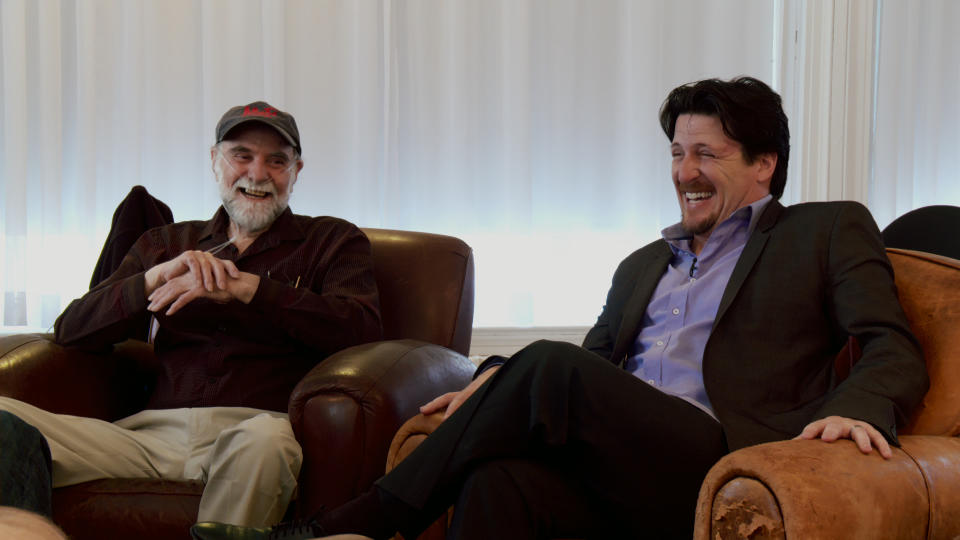
But, Frank, did you feel a responsibility with Miss Piggy — I remember she was on the cover of the Saturday Evening Post, representing women in the workforce?
Oz: She was on tons of covers. She was huge. She was massive, yeah.
Miss Piggy, performed by Oz, and Kermit the Frog, performed by Henson, in The Great Muppet Caper. (1981).
Did you feel a responsibility of any kind to live up to a certain ideal with her?
Oz: If one lives up to anything external as a performer, you’re screwed. That’s not one’s job. That is not something that is my responsibility. My responsibility is to entertain and perform the script with my fellow performers and try to bring that alive. After that, it’s none of my business.
Brill: Exactly. If you thought about that, you’d get frozen. You can’t say, Oh, I have a responsibility for all the females who are watching.
Oz: And that’s when things get really dull and didactic.
One of the highlights of the film is when you talk about all the insane situations you found yourselves in, and that Jim put himself in, while performing the Muppets. I’m wondering if you have specific memories of a moment when you went, “Oh, my God, I cannot believe I’m doing this right now.”
Oz: I do. I was 20, still too frightened to do voices. But there were two characters called Wilkins and Wontkins, and they were performers for these eight-second commercial spots, and they sold things — mainly coffee. So the idea was that Wilkins says something positive about Wilkins coffee: “Hey, don’t you love Wilkins coffee?” And Wontkins says something negative about the coffee, and then Wilkins does something violent to him, just destroys him. The first one I saw, he blows him away with a cannon. But we were doing a lot of them, and one was Wontkins saying, “Old Man Wilkins hired me to sell his crummy coffee.” And then, this is bizarre, but a match comes in and lights Wontkins in flames, and Wilkins says, “He just fired you too!” So what happened was, there’s something called cold flame that magicians use, and you can put it on your finger and light it, and it will burn. But the actual finger won’t burn, the liquid around it burns. And so I had cold flame all over my arm to protect it, and behind the stage there, I had a big bucket full of water. And on the first take he lit the match, and the whole thing went “Whoosh!” and went right down my arm, and burned all my hair off! And of course, Jim said, “OK, take two.”
Goelz: On Fraggle Rock, we had a head writer named Jerry Juhl. He was a longtime part of the Muppets, one of the first four people. And I had a character named Traveling Matt who went out into the field every week, exploring and misunderstanding what he saw. So Jerry would sit in his office and think of things for me to do. One week I was sent out to a chicken coop, and I was in a little closed room with a dozen chickens, which is not pleasant, on the ground, lying down under a moving blanket, working this character. And Jerry is back in his office, typing something else, and just smiling and thinking, He’s probably in the chicken coop. The next week I was in a little tiny pen, on the ground, next to a 700-pound sow. The zookeeper said, “If she starts to roll? Get out.” And then I found myself at the city d’Muppets Take Manhattan Ump covered in garbage — I’m covered in garbage, Matt is sitting on top of it. And then there was the roller coaster. It took 13 trips to do all the shots, and he sent me there because he knew I didn’t like roller coasters. And so, again, he’s sitting in his office, working on something else, going [checks his watch, chuckles].
Did you have any experiences like that on the Muppet movies?
Barretta: Driving things is always a little uncomfortable, when you’re in the front [with the puppet] and there’s somebody driving from the back and they’re hiding back there. And you’re not sure how well they can really see, but you have to trust them.
The hazardous taxi scene from The Great Muppet Caper, featuring Henson as Kermit, Oz as Fozzie, and Goelz as Gonzo and Beauregard.
Goelz: In The Great Muppet Caper, there was a shot where Beauregard was driving a taxi, and Kermit, Fozzie, and Gonzo were in the backseat. And the car came down a city street, went around in a loop, and then went right in the front door of a hotel.
Oz: Smashed right through it.
Goelz: Broke a breakaway door. And there was a driver wearing a Beauregard suit, so he was driving and he could sort of see through the mouth, and Frank, Jim, and I were on the floor of this little Austin taxicab —
Oz: In the backseat.
Goelz: Well, there’s no seat. It was taken out.
Oz: I mean supposedly in the backseat.
Goelz: Yeah, and the characters were working above us. So we’re sitting right on the floorboards with a little cushion. And the door was 3 inches wider than the car on each side. So he had to line it up just right or we were going to hit the side of the door and just all get crushed, because we didn’t have seat belts or anything like that. And he’s going, like, 25 miles an hour, doing this loop, skitting around in a circle. And he goes right in the door, and he makes it — it was perfect. But I’m just sitting back there thinking, It’s Jim and Frank and I — what happens if he clips the door?
Frank, when you directed Muppets Take Manhattan, did you end up putting anyone in mortal danger?
Goelz: He put us through hell.
Oz: Not danger, hell.
Goelz: Yeah, it was hell; it was different. In hell there’s no death. There’s no chance of getting killed in Frank’s movie and not having to work with him anymore.
Oz: What happened was, I had co-directed Dark Crystal, which means I was learning on the job while helping Jim direct his movie. And then I shot Muppets Take Manhattan next. So that was my first movie by myself. And I thought I had to do everything myself, and I thought I had to know everything — every first-time director’s mistake. And I was just so hard on these guys. Dave hated my guts.
Goelz: Oh, for years! Years. Still a little residual.
Oz: Because I did all my characters also. I was directing and doing my characters. And I also knew what these guys can do and what they can’t do. And so I pushed them, and of course it wasn’t very nice, and I was an a**hole. That’s what happened. I put them through hell.
Brill: But you only asked for a couple of takes, right?
Oz: There was a time I was pretty intense. Very intense.
Brill: “Take 42! 43!”
The opening number from The Muppets Take Manhattan (1984), directed by Oz.
What’s the most takes you ever remember doing?
Brill: Oh, I don’t remember. But Frank does that — because you’re very self-critical of anything you do.
Oz: That’s true.
Brill: So with a Bert and Ernie skit, or something like that, you would say, “Oops, sorry, sorry guys. I didn’t get that.” I sometimes thought you did that just because you wanted to do it over and over again, because you still hadn’t achieved exactly what you wanted.
Oz: Oh, yeah, I was terrible. The idea is, you have a play board here [above the puppeteer’s head] and you can’t see. So the worst thing to do — you can’t have your head up. But if I’m doing a lousy take, I’m going like this. [Peeks head up from under the play board] It was terrible! But you could control a take that way. If I didn’t want them to accept my lousy take, I’d put my head in the shot. “Oh, I’m so sorry!”
Goelz: I worked with him for 44 years or so — this is the first time he’s admitted that.
Muppet Guys Talking is available for streaming on March 16 exclusively at MuppetGuysTalking.com.
Read more from Yahoo Entertainment:


